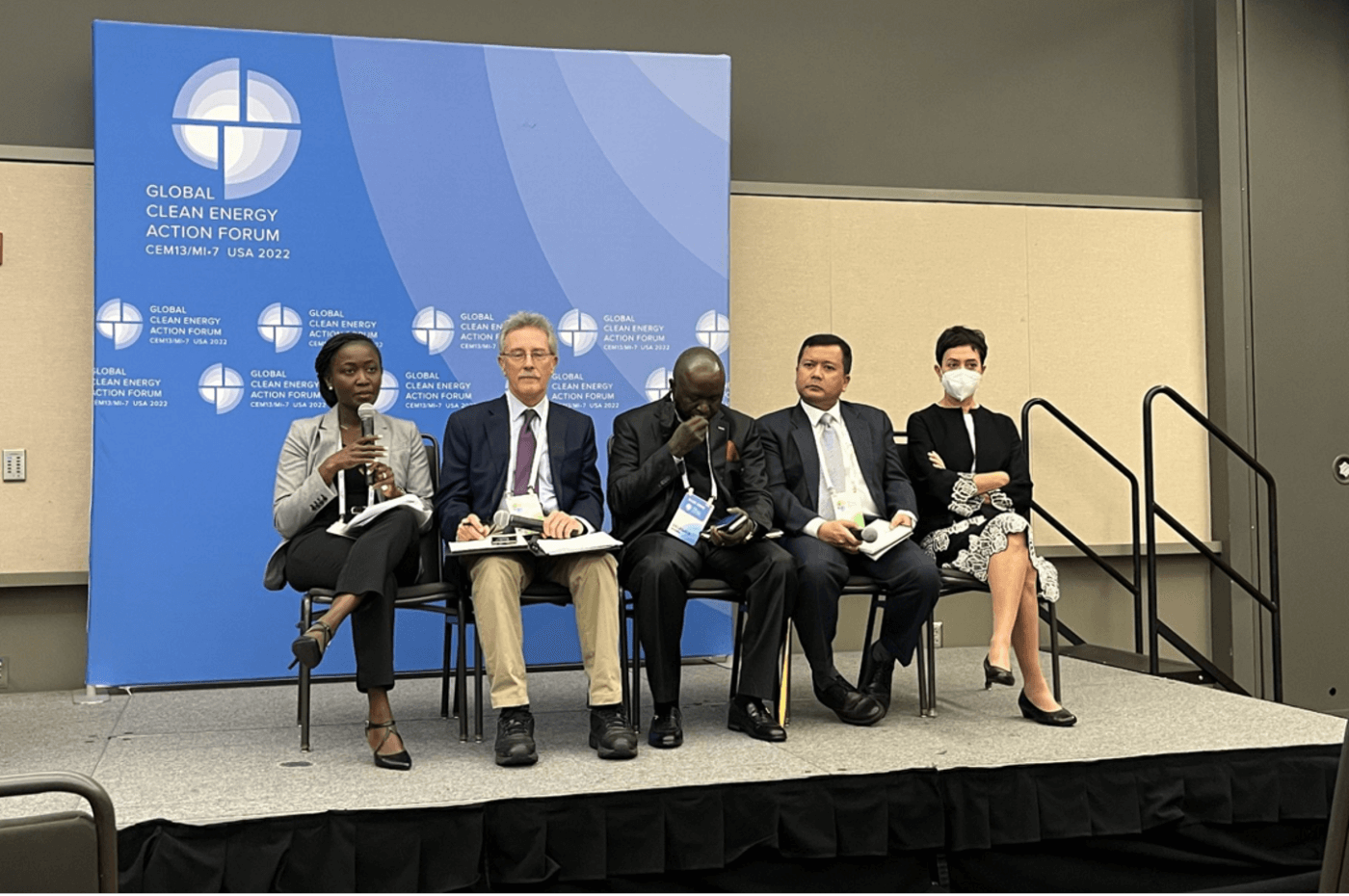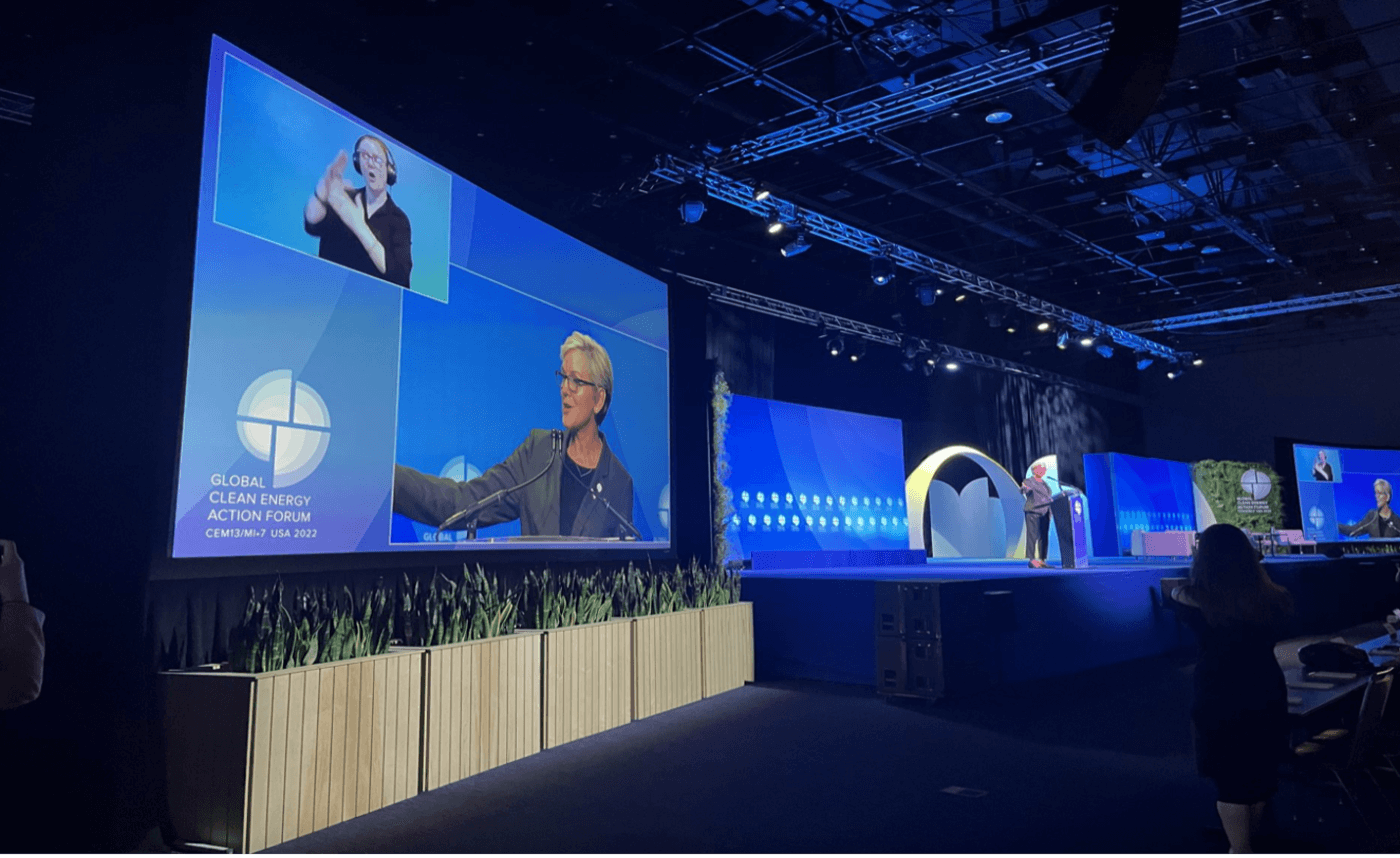
World leaders and energy experts at the Global Clean Energy Action Forum: We need more solutions, now
Leaders from around the world showcased their support for the swift development, demonstration, and deployment of an expanded suite of climate solutions last week at the Global Clean Energy Action Forum (GCEAF), a clear evolution in tone that is testament to a growing recognition of the realities of climate action.
The theme of the 2022 forum, “Rapid Innovation and Deployment,” placed the urgency of the clean energy transition at the forefront of discussion, with events focused on increased international and cross-sectoral cooperation to commercialize climate solutions. World leaders paid particular consideration to energy security, jobs, and affordability in high-level panel discussions, and homed in on the importance of accelerating solutions like carbon capture deployment, leveraging zero-carbon fuels like hydrogen, advancing nuclear energy to create low-carbon energy markets, and driving an energy transition that creates and maintains jobs.

Underscoring the need for this expanded suite of solutions, CATF’s Lily Odarno kicked off our presence at GCEAF by bringing together a panel of experts working across the Global South to discuss the need for carbon capture in developing economies. With government minister perspectives from The Honorable Peter Ekweozoh of Nigeria and The Honorable Luky Yusgiantoro of Indonesia, as well as perspectives from the World Bank and IEA Greenhouse Gas R&D Programme (IEAGHG), Odarno led a discussion on the importance of advancing energy solutions that alleviate energy poverty while meeting growing energy demand. “As we discuss energy in the developing world,” she said, “we have to ground this discussion in the practical and ethical realities of what communities are dealing with every day.” That means more energy, not less, and more solutions, not fewer, to increase our ability to customize to a given region’s needs.
Assistant Secretary for Fossil Energy and Carbon Management Brad Crabtree from the U.S. Department of Energy offered remarks at Odarno’s panel as well, saying “We must advance energy solutions for countries in the Global South, solutions that don’t only reduce emissions but that make sense for those countries and their unique circumstances with respect to energy access, energy security, and economies.”
Building on the theme of region-centric approaches to climate action, CATF’s Senior Director in Europe Lee Beck joined a panel to discuss the European energy crisis, highlighting how the renewed wave of investments in unabated fossil fuel infrastructure underscores the consequences of pathway dependency. She made the case for marrying energy security and climate action by pursuing all viable technological and keeping a range of policy options on the table. She also reminded participants that “a clean Europe or a clean U.S. is not the end-game, it’s just the beginning. Ultimately, we will need to commercialize all climate technology options to enable a globally fair energy transition.”

With a nod toward the need for increased energy security, support for hydrogen fuels was on full display throughout the Global Clean Energy Action Forum, including in a major announcement from the U.S. Department of Energy Secretary Jennifer Granholm. Secretary Granholm unveiled a historic $7 billion funding opportunity for regional clean hydrogen hubs on the plenary stage, while also releasing draft guidance for a clean hydrogen production standard and a draft National Clean Hydrogen Strategy and Roadmap — enormous progress to support the development of a robust, low-emission hydrogen economy in the U.S.

And she wasn’t the only one. “This is happening,” Special Presidential Envoy on Climate Change John Kerry said about the development of the global hydrogen economy at a CATF-convened roundtable on opportunities to leverage hydrogen’s full value chain. Other participants that CATF engaged in the roundtable included government minister Giovani Machado of Brazil and National Grid CEO John Pettigrew. Special Envoy Kerry emphasized the importance of hydrogen to full decarbonization, and provided insight into the value of various production pathways.
Lee Beck brought CATF’s perspective into the discussion, highlighting the need to re-imagine the global fuels markets for a climate-aligned world and to move beyond pathway dependency to focus on developing capacity to meet the enormous projected demand for zero-carbon fuels. “We must let the hydrogen standards currently being drawn up do their work,” she said, “and we must reframe the hydrogen conversation from colors to volumes to unlock a global market for zero-carbon fuels.”

One of those potential pathways for meeting hydrogen demand is through nuclear-generated hydrogen. CATF’s Carlos Leipner convened and shared expertise on a nuclear hydrogen-focused panel at the GCEAF — highlighting the work of the newly formed and quickly growing Nuclear Hydrogen Initiative. Alongside leaders like Assistant Secretary for the Office of Nuclear Energy Dr. Kathryn Huff from the U.S. Department of Energy, Japan’s State Minister of Economy, Trade, and Industry Nakatani Shinichi, Associate Deputy Minister of Canada Mollie Johnson, and OECD’s Michel Berthélemy, Leipner emphasized the scale of projected demand for low-emissions hydrogen and explained how nuclear energy offers multiple pathways to produce and meet that demand with a relatively low land footprint. Leipner highlighted the value and importance of bringing stakeholders together from across the nuclear energy and hydrogen value chains to overcome obstacles to nuclear hydrogen deployment.

CATF was at the center of discussions on carbon management technologies like carbon dioxide removal and CO2 transport and storage at GCEAF, too.
At a Clean Energy Ministerial and CEO Roundtable discussion, Lee Beck moderated a discussion with global leaders from government and the private sector on the need to rapidly deploy carbon capture and storage projects, including permanent carbon dioxide removal. Driven by clear signals from the Intergovernmental Panel on Climate Change and the International Energy Agency showing that the world is expected to need gigatons of CO2 removal capacity this century, markets, technology, and policy have been evolving rapidly to facilitate a near term scale-up.
However, leaders noted that key challenges remain. We must build trust in technologies through megaton scale demonstration facilities, and we must formulate global standards that guide voluntary and compliance markets to ensure accuracy and accountability. Leaders also highlighted policy optionality to enable multi-technology pathways for permanent CDR solutions, as well as the need for 24/7 clean, affordable electricity and a workforce with the skills needed to build the energy system of the future.
Most importantly, participants discussed the need for a peer and partnership approach to support region-centric visions and capacity-building for technology deployment and infrastructure in developing countries. Finally, ministers emphasized the need to adjust climate finance to enable funding for a wide range of technology options.
Overall, the Global Clean Energy Action Forum provided an important platform for a shift in tone, with the world’s energy leaders recognizing the need for and vocally advocating for an expanded suite of clean energy solutions. As a collective, we are beginning to reckon with the scale of the challenge and the broader set of considerations that must be addressed to tackle both climate and the myriad additional challenges we face simultaneously. We can expect more of this reckoning, and more solutions thinking at COP27 in Sharm El-Sheikh and COP28 in Dubai, with innovation and emerging markets front and center.


